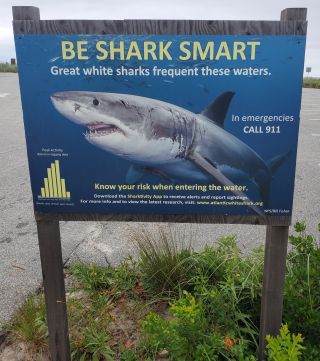Fear
Sharks! What Lies Behind Our Fear of Them?
Most Americans confess they are scared of sharks. Their reasons why are murky.
Updated August 18, 2023 Reviewed by Kaja Perina
Key points
- More than half of all Americans are scared of sharks, for both rational and irrational reasons.
- Great White Sharks in particular trigger terror, despite the scarcity of actual attacks.
- Sharks' scary features and lack of relatable or "cuddly" attributes lie behind the fear-reaction in humans.
- Media and other businesses contribute to the hype surrounding "killer sharks."

"Shark!”
On a sunny summer day on a sandy Cape Cod beach barely nibbled by the lollygagging wavelets of August, the mere word can trigger panic among beachgoers. And it's not just beachgoers: 51 percent of Americans admit they are scared of sharks and 38 percent of Americans told an IPSOS survey they are so terrified of selachimorpha (the scientific term for the shark family) that they won't even go in the water.
And yet, statistically speaking, virtually none have ever seen a shark outside the aquarium, let alone been threatened by one. What is the basis for such terror?
There are, of course, cogent reasons to be frightened of sharks on Cape Cod. During warmer months the peninsula's southeastern waters are home to what's possibly the world's greatest concentration of carcharodon carcharias, the White Shark who was the model for the psychopathic fish of Stephen Spielberg's horror film Jaws, and of the Peter Benchley novel it was based on. It makes perfect sense for bathers to be cautious and to not splash blithely around areas where Great Whites are present. Consider, after all, how a character in Jaws describes a shark: "Sharks are like axe-murderers. ... People react to them with their guts. There’s something crazy and evil and uncontrollable about them."
But reason should also remind us that non-Hollywood sharks couldn't care less about biting humans; what Great Whites like to bite, and eat, is seals, whose rebounding population in Cape waters is the reason for the sharks' presence in the first place. Humans tend to get bitten by mistake.
The statistics bear this out for sharks in general: while 100 million sharks are killed by humans yearly, only five to eight people die in shark attacks worldwide. Where the Cape is concerned, one of the area's 3 million summer visitors was indeed killed by a shark five years ago, but the previous fatal attack was in 1938, and no one has died from a shark attack since 2018.
And yet our fear of sharks (aka "galeophobia"), even inland or in places that have never known a shark attack, continues unabated, intensified by media whose ratings depend on dramatic taglines like "Killer Shark Circles Man and Eats Him Alive." What might be the deeper, less conscious reasons for this terror?
One obvious trigger is the shark's appearance. Divers and fishermen in Australia, who come across Great White Sharks more than most, describe their "black and beady" eyes and their "diabolical, gruesome, terrifying" jaws and teeth [1]. Certainly the sharks' speed and power in an aquatic environment lend force to their evil aspect.
Possibly because of their exceptional skill at detecting and ambushing prey, sharks are often considered intelligent, cold-blooded, even vengeful: characteristics embodied by the rogue shark in Jaws, which echoes to some extent the portrait of that great white whale, Moby Dick, in Herman Melville's eponymous novel.
The dislike of cold eyes, scary jaws and a proclivity for ambush also finds echoes in arachnophobia, the fear of spiders, an insect which shares those traits with sharks. It is a physiognomy that, in the case of spiders at least, sparks response in the amygdala, the "fear headquarters" of the human brain. Overall, humans have evolutionary pressures that predispose them to fear large predators, even if those predators do not normally target humans.
Another factor that makes us fear sharks is their habit of hanging out or feeding in the shallower waters that constitute humans' boundary zone with the ocean wild. Such areas, according to the anthropologist Frederick Barth, are defined by the alien transgressions that occur there. In this kind of liminal zone, a human group typically claims the area as their own in opposition to different ethnicities, or species, seen as hostile: as invading, encroaching, lurking or stalking to the detriment of the group concerned.
Finally, sharks, and in particular the Great White, differ from other potentially dangerous predators — such as tigers, bears and wolves — in that not only do they rule an oceanic environment that is uniquely hostile to humans but also, in contrast to frolicking bear and tiger cubs or the maternal qualities of a she-wolf, possess zero "cuddly" or 'cute' qualities that might elicit empathy from our own species.

Galeophobia, of course, has a flip side: an attraction based on the sort of fascinated horror that drives us to watch vampire and serial-killer films like Last Voyage of the Demeter, or the Saw, Scream or Friday the 13th franchises. Or, for that matter, Meg 2: The Trench, a 2023 release featuring the megalodon, a giant prehistoric killer shark, whose advertising tagline is "New Meg: Old chum".
And fear of sharks, of course, draws viewers to the notorious "Shark Week" that plays on the Discovery Channel every summer. Psychological arousal—the surge of excitement and release—may explain our attraction to the idea of scary killers such as we imagine sharks to be.
This kind of fascinated arousal not only feeds the media machine but also underlies a growing industry on Cape Cod based on tourists' appetite for shark-viewing boat tours and Great White paraphernalia. Beach-goers on the Cape have been spotted tracking Great Whites on a shark-tracking app, Sharktivity, as they excitedly scan the swells for fins.
It is tempting to speculate that some of the tourists' fascination might also be based on a growing awareness of how mysterious and vulnerable the ocean has become in a rapidly warming world; how vulnerable, in particular, are sharks (that 100 million annual mortality rate!) However no studies to date have plumbed such human depths.
References
[1]—"Kill or Be Killed," The Australian, 8 September 2005




